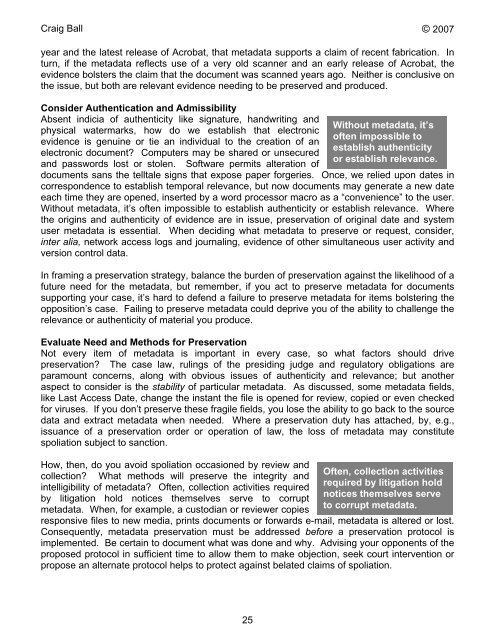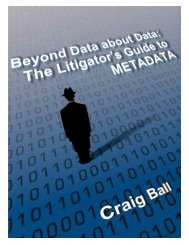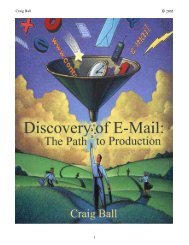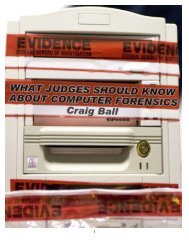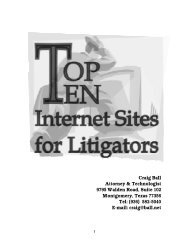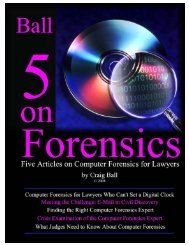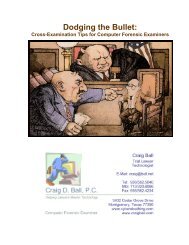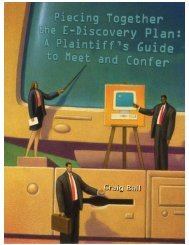Six Articles on Electronic - Craig Ball
Six Articles on Electronic - Craig Ball
Six Articles on Electronic - Craig Ball
You also want an ePaper? Increase the reach of your titles
YUMPU automatically turns print PDFs into web optimized ePapers that Google loves.
<strong>Craig</strong> <strong>Ball</strong> © 2007<br />
year and the latest release of Acrobat, that metadata supports a claim of recent fabricati<strong>on</strong>. In<br />
turn, if the metadata reflects use of a very old scanner and an early release of Acrobat, the<br />
evidence bolsters the claim that the document was scanned years ago. Neither is c<strong>on</strong>clusive <strong>on</strong><br />
the issue, but both are relevant evidence needing to be preserved and produced.<br />
C<strong>on</strong>sider Authenticati<strong>on</strong> and Admissibility<br />
Absent indicia of authenticity like signature, handwriting and<br />
physical watermarks, how do we establish that electr<strong>on</strong>ic<br />
evidence is genuine or tie an individual to the creati<strong>on</strong> of an<br />
electr<strong>on</strong>ic document? Computers may be shared or unsecured<br />
and passwords lost or stolen. Software permits alterati<strong>on</strong> of<br />
documents sans the telltale signs that expose paper forgeries. Once, we relied up<strong>on</strong> dates in<br />
corresp<strong>on</strong>dence to establish temporal relevance, but now documents may generate a new date<br />
each time they are opened, inserted by a word processor macro as a “c<strong>on</strong>venience” to the user.<br />
Without metadata, it’s often impossible to establish authenticity or establish relevance. Where<br />
the origins and authenticity of evidence are in issue, preservati<strong>on</strong> of original date and system<br />
user metadata is essential. When deciding what metadata to preserve or request, c<strong>on</strong>sider,<br />
inter alia, network access logs and journaling, evidence of other simultaneous user activity and<br />
versi<strong>on</strong> c<strong>on</strong>trol data.<br />
In framing a preservati<strong>on</strong> strategy, balance the burden of preservati<strong>on</strong> against the likelihood of a<br />
future need for the metadata, but remember, if you act to preserve metadata for documents<br />
supporting your case, it’s hard to defend a failure to preserve metadata for items bolstering the<br />
oppositi<strong>on</strong>’s case. Failing to preserve metadata could deprive you of the ability to challenge the<br />
relevance or authenticity of material you produce.<br />
Evaluate Need and Methods for Preservati<strong>on</strong><br />
Not every item of metadata is important in every case, so what factors should drive<br />
preservati<strong>on</strong>? The case law, rulings of the presiding judge and regulatory obligati<strong>on</strong>s are<br />
paramount c<strong>on</strong>cerns, al<strong>on</strong>g with obvious issues of authenticity and relevance; but another<br />
aspect to c<strong>on</strong>sider is the stability of particular metadata. As discussed, some metadata fields,<br />
like Last Access Date, change the instant the file is opened for review, copied or even checked<br />
for viruses. If you d<strong>on</strong>’t preserve these fragile fields, you lose the ability to go back to the source<br />
data and extract metadata when needed. Where a preservati<strong>on</strong> duty has attached, by, e.g.,<br />
issuance of a preservati<strong>on</strong> order or operati<strong>on</strong> of law, the loss of metadata may c<strong>on</strong>stitute<br />
spoliati<strong>on</strong> subject to sancti<strong>on</strong>.<br />
How, then, do you avoid spoliati<strong>on</strong> occasi<strong>on</strong>ed by review and<br />
collecti<strong>on</strong>? What methods will preserve the integrity and<br />
intelligibility of metadata? Often, collecti<strong>on</strong> activities required<br />
by litigati<strong>on</strong> hold notices themselves serve to corrupt<br />
metadata. When, for example, a custodian or reviewer copies<br />
Without metadata, it’s<br />
often impossible to<br />
establish authenticity<br />
or establish relevance.<br />
Often, collecti<strong>on</strong> activities<br />
required by litigati<strong>on</strong> hold<br />
notices themselves serve<br />
to corrupt metadata.<br />
resp<strong>on</strong>sive files to new media, prints documents or forwards e-mail, metadata is altered or lost.<br />
C<strong>on</strong>sequently, metadata preservati<strong>on</strong> must be addressed before a preservati<strong>on</strong> protocol is<br />
implemented. Be certain to document what was d<strong>on</strong>e and why. Advising your opp<strong>on</strong>ents of the<br />
proposed protocol in sufficient time to allow them to make objecti<strong>on</strong>, seek court interventi<strong>on</strong> or<br />
propose an alternate protocol helps to protect against belated claims of spoliati<strong>on</strong>.<br />
25


